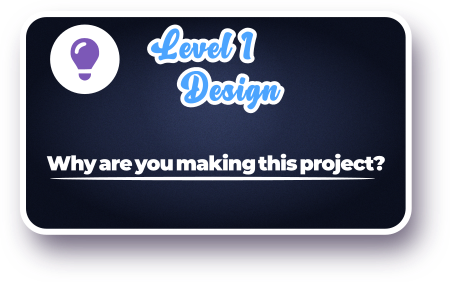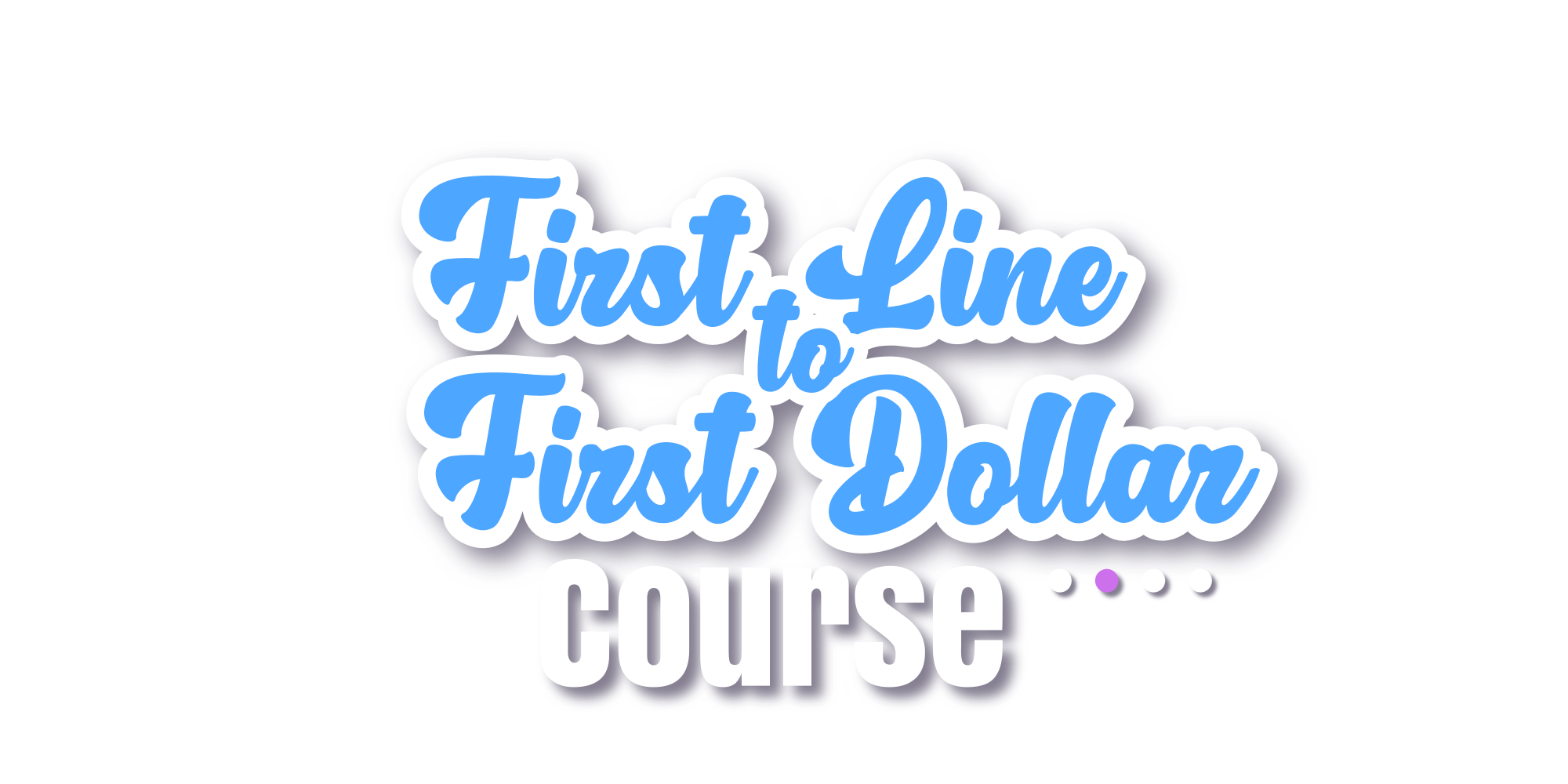Why are you making a game?
Hey!
Something I'm really proud about in this course is how we organized its content aiming to answer important questions you must have answers to in order to make a successful project. The questions are:
- Why are you making this project?
- What you must deliver to complete it?
- How are you going to do these deliverables?
- When and where will you release it?
- Who needs to hear about it?
Yes, technically are six questions! But...don't mind with that. The important thing is to answer them. And this is what we do throughout each module of the course, starting with the Leve 1 - Design. So let's understand what will we do in this module!

Have you ever caught yourself asking this question? It's no easy thing to come out with an answer for that, but this very first question will guide you throughout every other single step of the journey.
It's through this answer that you will avoid feature creep and other management issues. This is because you should always fallback to the answer to this question when you need to decide your project's life:
How does this help me with the project's purpose?
Here are some possible answers just to exemplify how powerful this question is:
- It supplies a market demand for cooking games
- It serves as a prototype for a Point-Cloud Gesture Recognition algorithm
- It pushes the limit of GPUs to see how far they can maintain frame rates up to 120fps
- It tells an alternative story to an anime/manga/movie/cartoon/animation
- It helps men understand the importance of finding their purpose
- It helps women understand the intricacies of positions of power
- It showcases a fantasy I had about how would it be to live in Mars
- It helps teenagers understand and get ready for adulthood
- It showcases an asset pack I want to sell
- It helps people learn about personal finances
Anyway, the more detailed you can get in your fundamental reason, the better. For instance, one of my future projects is about using an RTS game to showcase steering behaviors and basic AI fundaments because I saw that there's a market demand for these topics due to the raise in Vampire Survivors clones.
Understanding your motivation
The answer to this question can be anything that justifies the existence of a project. If you just want to make it for fun, it's fine. If you want you make it a product, also fine. The idea here is to align your expectations so you can properly access what you will do next, your investments, the potential income, and so on.
For instance, let's say you find out a community of 50000 people who love coffee and everything regarding coffee: how they plant, harvest, toast, brew, taste, and smell coffee and many of these people would love to be a barista and work with coffee all-day. You make a post or two inquiring if these people would play a Barista Simulator game. They give you some feedback and you actually figure out that they would love if the game was more focused on the coffee itself and the many sensorial experiences that a good coffee could provide. 300 people engage in your post. If you decide to sell just to these people, you would sell the game for $20 dollars. Of course, you understand that your game wouldn't sell just to these lovely souls, but they would be your first customers. So you can pretty much have a budget of $6000 to make this game, or at least a prototype.
You look at your monthly expenses and you notice that you have a fixed budget of $2000 a month. This means you could invest three months working on this game. So you have a nice answer at this point. If I ask you why are you doing this project:
This project provides fulfills a market demand for a small coffee brewing community by offering them a simulated experience about the various faces of coffee's taste and scent.
With this in mind, you can always fallback to this answer in every future design decision:
- How does adding a crafting system to make mugs help support the experience of coffee's taste and scent for this community? Do they debate about this in forums? Is it actually relevant?
- How does adding a coffee naming feature help this experience?
- Does adding a storyline about defeating multiple baristas help in this experience? Is it something this community would like to have? Sounds like a good idea, but not for this specific experience.
- What about adding latte art to the game? How does this help simulate the various faces of coffee taste and scent? Doesn't latte art lean more toward visuals than taste and scent?
- Should we add a system where players need to choose between multiple brewing methods? Based on some debates on the community we saw that depending on the brewing method the scent and taste may differ a lot, so sounds like something the game should have
- How much detail should we have on the game art? Is it plausible to use custom first-party art for a three-month project?
- Should I hire someone to do the programming? With a budget of $6000 and three months, can I do it myself? If I do it myself, will I be able to deliver it within three months? Do I have some savings to risk increasing the budget? Do these people want a high-level art for a game like this? Can I scale the art quality to reach a broader audience after releasing a first version to this core audience?
Well...this can get really interesting and I could keep going with all the questions that we could ask. But the important thing to notice is: if you go back to your answer to the underlying question "Why are you making this game" you will always get an answer to these secondary questions as well and will be able to make informed decisions to help you don't get sidetracked throughout the development stage of your project.
Note that, by trying to find an answer to this question, you also came out with a concept and started to design the very game itself. So it becomes a natural process to generate ideas and good features for your games just by doing some market research. And even better, you have external validation that there might be an actual demand for it.
Help us fund this project
Of course, there's a lot more to that, and seeing this in practice is way more enriching. And this is why we want to turn this into a whole module in the course! And we need your help supporting us so we can work full-time in this and other interesting topics for you.
Help us fund this course! Click the link below and grab a pre-sales reward so you can get early access to this course as we make it in the upcoming months!
https://itch.io/s/123447/first-line-to-first-dollar-pre-sales
That said, thank you so much for your support. Keep developing and until the next time!~
Henrique Campos
Files
Get First Line to First Dollar
First Line to First Dollar
A complete course to help you go from concept to publishing and earning your first dollars with your games
| Status | In development |
| Author | Ludonauta |
| Genre | Educational, Platformer |
| Tags | course, Game Design, Godot, Indie, Itch Funding, Management |
More posts
- Meet Vini, the Project Manager Tutor24 days ago
- Revamped Main Page and Course Access79 days ago
- Master Your Game: Game Loop Chapter ReleaseApr 17, 2025
- Machinations Chapter ReleaseMar 06, 2025
- First Line to First Dollar: Discord CommunityFeb 28, 2025
- First Line to First Dollar Business Models Chapter ReleaseJan 29, 2025
- Level Design 101: "Progression Systems" Chapter is HERE!Jan 20, 2025
- Internal Economies Chapter ReleaseJan 03, 2025
- Incentive Systems Chapter ReleaseDec 27, 2024
- Game Design Secrets Revealed: Fresh Chapter Drop!Dec 20, 2024

Comments
Log in with itch.io to leave a comment.
I'm already getting valuable information from this, it's making me think about how I go about properly setting the foundations of a project. I'm eagerly waiting for more.